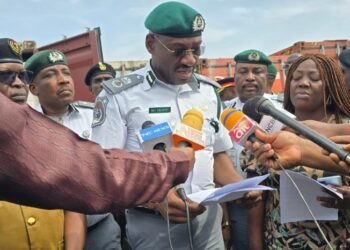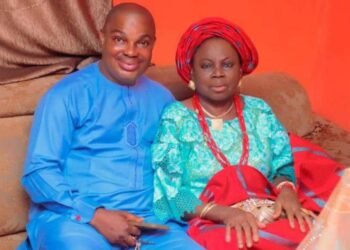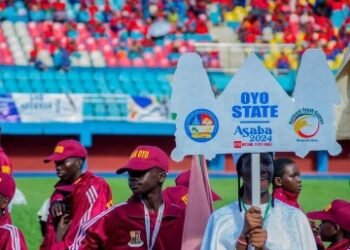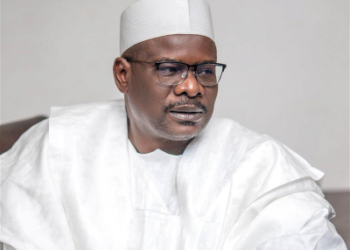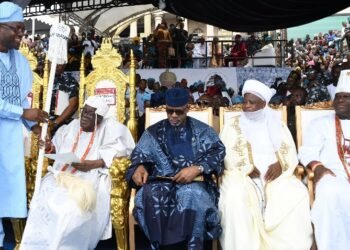Festus Adedayo, Tinubu And The Character Question
Regardless of his proclivities for misdirected mischief you must give it to him. Dr. Festus Adedayo, political scientist, lawyer, journalist and Tribune columnist, has impressive academic and professional credentials. He is also a good prose stylist.
For years, I have considered Festus to be not just a friend and professional colleague but also a brother. As the Chief Press Secretary to Asiwaju Bola Ahmed Tinubu when he was governor of Lagos State between 1999 and 2005, Festus, who was then the Features Editor of the Nigerian Tribune, was one of the most frequent visitors to my office at the Lagos State government Secretariat, Alausa.
On a number of the several occasions that Festus visited my office from his base in Ibadan, I would ensure he met either the Commissioner for Information and Strategy, Mr Dele Alake, or the governor directly. It was our practice to bring leading journalists and columnists face to face with the governor so that they could debate him on issues and he could also have access to views from outside those of us serving in government.
Against this background, I find Dr. Adedayo’s column of last Sunday titled ‘Why Tinubu Must Never be President of Nigeria’ curious and inaccurate in a number of respects.
Naturally, as Features Editor, the controversies raging around discrepancies in the information supplied in the governor’s INEC form was of professional interest to him. But it was not an overriding or consuming passion for him contrary to the impression he sought to create.
I cannot recall any occasion when he visited my office with the intention of investigating issues surrounding Tinubu’s certificates or the institutions he attended. And there was no time he had any difficulties seeing me, the commissioner and, if necessary, the governor on issues of interest to him.
As Features Editor of the Tribune, he wrote regularly on the policies and programmes of the state government. However, those who worked daily and consistently on issues affecting Lagos State were the Tribune’s full time Lagos State government correspondent, based in Alausa and the Lagos City Editor, based on Lagos Island.
I must admit that because of our friendship, I was partial towards Festus in channeling most of the Governor’s Office adverts meant for the Tribune titles through him, rather than the newspaper’s accredited correspondent at Alausa. And, as was my practice then, I never deducted any commissions from these adverts. If Festus will be honest, he will admit that he has profusely expressed his gratitude to me each time we have met.
I have uncharacteristically gone into these personal details to show that the relationship between Festus and the Tinubu administration was quite close and not as adversarial as he tried to portray it in his column.
The exaggerated, arrogant and hypocritical sense of moral integrity and self-righteousness exhibited throughout Dr. Adedayo’s column in question is so unlike the ever humble and unassuming Festus I used to know and there is just no basis for this.
Of course, the questions about Tinubu’s certificates, institutions and age raised by Dr. Adedayo are critical and cannot be ignored, especially by someone who wants to be President of Nigeria. But Festus’s column is even more baffling because he is in a position to know and I am convinced that he does know that these questions have been thoroughly investigated and conclusively addressed by the appropriate institutional authority legally competent to do so. What then could be his motive? I cannot pretend to know.
Shortly after he was sworn in as governor of Lagos State in May 1999, there were allegations widely published in the media that Tinubu had perjured and forged the credentials that qualified him to run for the gubernatorial election in the state. The allegations were contained in a petition dated August 12, 1999, written by one Alhaji Jameed Seriki of No. 62 Balogun Street, West, Lagos, and one Dr. Waliu Balogun-Smith of No. 5, Unity Road, Ikeja.
The kernel of their allegations were: (1) that there was a discrepancy in the age of the governor since the profile published during his inauguration stated that he was born in 1952 and the age on his transcript at the Chicago State University claimed that he was born in 1954; (2) that the governor did not attend Government College, Ibadan, as was stated in his profile and INEC FORM CF.001; and (3) the governor did not attend University of Chicago as claimed in INEC FORM CF and an affidavit sworn to at the Ikeja High Court of Justice on 29th December 1998.
It was unanimously agreed by all legal authorities that the governor enjoyed legal immunity courtesy Section 308 of the 1999 Constitution and that the Lagos State House of Assembly was the only competent institution that could investigate the governor and take punitive action against him, if he was deemed to have committed acts constituting gross misconduct.
Consequently, following a motion moved by Honourable Tajudeen Jaiyeola Agoro representing Lagos Mainland Constituency, the Speaker, Dr. Adeleke Olorunimbe Mamora, on Tuesday, September 21, 1999, set up a five-man ad hoc committee to investigate the allegations and report back to the House. The committee comprised Hon. Babajide Omoworare (Chairman), Hon. Thomas Ayodele Fadeyi, Hon. Adeniyi Akinmade, Hon. Ibrahim Gbola Gbabijo and Hon Saliu Olaitan Mustapha.
In its report to the House, the Committee stated that “The Committee deemed it fit to invite the petitioners and therefore wrote the petitioners. The letters were sent by courier. The petitioners did not attend the hearing and we have not heard from them up till now.
“We visited their address at 62 Balogun Street, West, Lagos and 5, Unity Road, Ikeja, Lagos, on Wednesday, September 22, 1999 and found out that the petitioners neither reside nor carry on any business at the addresses. Hence, we concluded that the petition was written in fictitious names. Attached herewith and marked “Annexures 1 and 2” are pictures of the buildings bearing the above addresses taken when the Committee visited the addresses. Also attached and marked “Annexxures 3 and 4″ are copies of the evidence of courier of the letters forwarded to the fictitious Petitioners”.
Despite this, the Committee continued with its investigation. Continuing, the committee stated in its report that “The Committee invited Editors of ThisDay Newspaper because of the prominence which they have given to the publication of the allegations. The Editors of ThisDay visited us informally, refusing to oblige our invitation and informing us that they would rely on their publications”.
The governor appeared before the Committee on Thursday, September 23, 1999, alongside his counsel, Mr. Femi Falana, who was then not yet a Senior Advocate of Nigeria (SAN).
According to the report, “The Governor of Lagos State started his evidence by admitting “full responsibility” for some of the “needless errors” being pointed at in recent publications and which formed the basis of allegations against him.
“The governor told the Committee that, as a result of the acrimonious primaries of the Alliance for Democracy (AD) in Lagos State and its attendant crisis, the information contained in both the INEC form and affidavit of loss of certificates was supplied by Senator Tokunbo Afikuyomi.
“The governor then submitted to the Committee a copy of the Social Democratic Party (SDP) senatorial candidate form, dated June 1, 1992, which he used to contest the 1992 senatorial election as candidate of the party for Lagos West. In the form, which he personally filled, the governor attached the certificates of Richard Daley College and Chicago State University. For his educational qualifications he filled B.Sc Accounting only”.
According to the committee report, “This according to him demonstrated that “needless errors” spotted in the 1999 INEC form were not consistent and that they were “genuine errors”. He further directed the attention of the committee to the INEC form CFO1 that bore a wrong date of 28 December, 1999 instead of 28 December, 1998.
“The error, he said, was made by INEC which printed the form. And not even the Commissioner of Oath detected the error. This, in his view, further confirmed that the hurried and confused manner under which the preparations for the governorship primaries of 1998 were made gave room to error on all sides”.
Giving further insight into their interaction with the governor, the committee report stated: “The governor spoke about his difficult and traumatic youth and how he scaled the hurdles of life as a self-made man. After his primary education, the governor said he was admitted into secondary school but he could not further his education because of his poverty. The governor thus had to engage in menial jobs before he proceeded to the United States of America in search of the Golden Fleece.
“The governor informed us that in America, he undertook various odd jobs and tried to improve himself academically. After five years of the most harrowing work experience, the governor said he enrolled at Richard Daley College in Chicago, which among others offers basic, remedial and academic classes, preparatory to entering Chicago State University. He presented a photocopy of a certificate issued by Richard Daley College (City Colleges of Chicago), a copy of which is attached as herewith and marked as “Annexure 5”.
“Throughout the time he studied in Chicago, the governor said he also had to fend for himself and that he actually paid his way through school by working extra hours as a tutor in the same university. He said he studied for extra hours, especially during summer. The governor said 27 (twenty seven) credit hours were transferred from Richard Daley College to Chicago State University, where he obtained Bachelor of Science in Business and Administration. His major was in Accounting”.
To back up his claims, Tinubu provided the committee with, at least, 11 documents, which were attached to its report as annexures. These included a copy of a letter dated September 6, 1978, written by Andrew F. Sikula, Dean, College of Business Administration informing Mr. Bola Tinubu that he had made the Dean’s Honours list by making a 3.50 or better grade point average; an inter-office memorandum of Chicago State University dated May 28, 1979 written by one Clyde Smith to the Honours Award Committee recommending Bola A. Tinubu as recipient of the outstanding senior award; copies of May/June 1979 edition of the TEMPO, Chicago State University Campus journal covering Chicago State University Annual Awards Ceremony.
“Bola Tinubu was described as the President of the Accounting Society and was also running for Student Government Association presidency; a Chicago State University statement issued by the Accounts Receivable Department on June 15, 1979 with his social security number; the Chicago State University Certificate dated 22nd June 1979 conferring on Bola A. Tinubu the degree of Bachelor of Science in Business and Administration (Accounting with honours); a copy of Chicago State University year book with the picture of Bola A. Tinubu on page 75; Chicago State University academic record transcript dated 11th July 1979; a Chicago State University letter dated August 20th 1999 addressed To Whom It May Concern advising that Bola A.Tinubu did indeed attend Chicago State University from August 1977 through June 1979; his pay slips when he worked as an accountant with Deloitte Haskins & Sells and at GTE Services Corporation before returning to Nigeria; a copy of Mobil Oil Nigeria Plc Certificate of Service dated 14th May 1992 issued in favor of Mr. B. A. Tinubu and a letter written by Mobil Oil Nigeria Plc dated December 29th, 1998, addressed to whom it may concern confirming that Mr. Tinubu was an employee of the Company between December 1, 1983 and May 17th, 1992.
“When he appeared before the Committee on Friday, September 24, 1999, Senator Tokunbo Afikuyomi, according to the committee’s report, “informed the committee that he was heading the unit of the governor’s campaign responsible for processing the form and he accepted responsibilities for the mistakes in the INEC forms.
“He said the forms were filled for the governor in a rush and under tense circumstances at a point when there were problems and crises in the party, Alliance for Democracy (AD), in Lagos State during the gubernatorial primary electioneering campaigns. He said as a result of the crises they had very little time to fill and process the INEC form. He said the Governor also hurriedly signed the forms so as to beat the deadline given by INEC for the submission of all forms”.
It was the legal opinion of Professor Itse Sagay (SAN) who accompanied Senator Afikuyomi to the proceedings, as cited in the committee’s report, that “even if the allegations against the Executive Governor of Lagos State are true, they are not impeachable offenses as the Lagos State House of Assembly only possesses power to impeach for gross misconduct in relation to his conduct while in office; that it is more of a moral matter than a legal issue. He suggested that the governor should apologize to the people of Lagos State concerning the mistakes he made in his forms, which were not intentional”.
“Chief Gani Fawehimmi whose testimony is also contained in the committee’s report “was of the view that the primary duty of the Lagos State House of Assembly is to determine if any law has been breached by the Lagos State Governor at this stage and not to determine the impeachment of the governor now.
“He said the House of Assembly must find out if the governor has committed any crime against the laws of Lagos State. The issue, according to him, is that there are 2 (two) affidavits deposed to by the Governor of Lagos State and false declaration has been established. Finally, Chief Fawehinmi summed up his evidence by stating that Governor Bola Tinubu volunteered false information on oath to enable him contest for the post of Governor of Lagos State”.
In his written defence on behalf of Tinubu before the panel, his counsel, Mr. Femi Falana, addressed the various allegations against the governor. On the issue of perjury, Mr. Falana submitted that “Since no iota of evidence has been led to show that the facts contained in the affidavits in dispute were given in the course of judicial proceedings or in anticipation of judicial proceedings, the offence of perjury cannot be sustained in the circumstances of this case”.
“On alleged forgery, he submitted that “From the facts of this case, no evidence has been led to show that Governor Tinubu presented a forged certificate to INEC. And in fact, Governor Tinubu never presented any forged certificate to INEC”.
“On the allegation of inaccurate information, Mr. Falana argued that “We urge the committee to believe the oral evidence of Governor Tinubu that it was Senator Tokunbo Afikuyomi that filled Form CF001 on his behalf and supplied the information contained in the affidavit dated 29th of December, 1998 to Barrister Oriola. This aspect of the governor’s evidence has been corroborated by Senator Tokunbo Afikuyomi who took responsibility for the errors contained in both documents*.
He also stated that “Perhaps to convince the committee that the governor did not set out to give false information to INEC, the committee may wish to examine the contents of a similar form dated June 1, 1992 filled by the governor himself when he was contesting election to the Senate. The governor did not, on his own, supply the information, which has formed the basis of the allegation of false information. In any case, since Senator Tokunbo Afikuyomi has admitted that the errors were made by him and not by the governor, we submit that the governor should not be penalized in the circumstances of this case.”
Mr. Falana also addressed at length, issues raised regarding Tinubu’s age declaration. He wrote in his statement to the committee and contained in its report that “From all the documents tendered before the committee, it is abundantly clear that the alleged false declaration of age as per the documents submitted to INEC before the election is an isolated inconsistency.
“In other words, whereas all the other documents contain one and identical age, i.e. 1952, the academic transcript of Chicago State University (which was not made under oath and which could not be elevated to the pedestal of a sworn-declaration) in which 1954 was given as the date of birth of the governor stands alone. It is predominantly clear, therefore, that taken together the age-claim of the governor, which he has continued to maintain, and the age contained in the other documents tendered, 1952 is the correct and accurate birth year of the governor.”
Beyond this, Mr. Falana submitted to the committee that “Assuming without accepting that the 1954 birth year contained in the transcript is the actual birth year of the governor, does it affect his eligibility as the Executive Governor of Lagos State as regards age-qualification?
“Under the Constitution of the Federal Republic of Nigeria, 1999, to be eligible to contest as a governor of a state, a contestant, among other requirements, must be 35 years of age. Even if the governor was born in 1954, he was qualified on age ground, to contest the gubernatorial elections when he did.
“In conclusion, it is an incontrovertible fact that the inconsistency of the governor’s age contained in the said transcript with that contained in the governor’s other documents did not secure for him any advantage in the elections that brought him to office.
“Furthermore, the said age did not render him ineligible as governor. From a legal standpoint, no offence could be said to have been committed. The governor did not prepare the transcript. It cannot be argued at all that the governor set out to mislead the electorate or deceive INEC to secure a clearance therefrom”.
To further aid its work, the Committee sought the legal opinion and advice of some renowned legal practitioners. These were Chief Fred Agbaje, a prominent constitutional lawyer; Deacon Dele Adesina, then the chairman of the Nigerian Bar Association, Ikeja branch; Mr. Olisa Agbakoba, constitutional lawyer and Senior Advocate of Nigeria (SAN) and Mr. Nurudeen Ogbara, then the Executive Secretary of the National Association of Democratic Lawyers (NADL).
I can only present here brief extracts from the detailed presentations of these legal luminaries to the Committee as contained in the latter’s report. Chief Fred Agbaje, according to the report, “was of the opinion that if it has not been contested that the governor attended Richard Daley College and the Chicago State University and obtained a degree, he is qualified for the post of governor of Lagos State.
“He said the minimum requirement is school certificate in both the Constitution of the Federal Republic of Nigeria and the INEC requirement form. He concluded that since the Governor did not fill the form himself, but was helped by his aide who later admitted he made some mistakes, the crime of the litigant should not be visited on the client”.
On the legal opinion of Mr. Olisa Agbakoba (SAN), the Committee report states among others that “He said there are two limbs to subsection 11 of Section 188. The first limb is an objective test i.e. a grave violation or breach of the provisions of the constitution.
“It is for the House to determine if the allegations against the governor, if established amount to a grave violation or breach of the constitution. Whether or not the allegations amount to a violation of his oath of office falls within discretion of this House under the second limb which is a subjective test, i.e misconduct of such nature as amounts in the opinion of the House of Assembly to gross misconduct”.
Among other submissions, Deacon Dele Adesina’s opinion to the Committee was that “Indeed, the governor is still competent and qualified to be eligible to contest for the post of the governor since the law says the minimum requirement is a school certificate. So, by having a certificate from Richard Daley College and a degree from Chicago State University, the governor is qualified to contest for the post of a governor”.
And in his legal advice to the Committee, the report cites Mr. Nurudeen Ogbara as stating among others that “On the issues of whether the governor gained an advantage or not, Mr Ogbara said that the governor could not have deliberately lied on oath since he is qualified whether he was born in 1952 or 1954. He could not see the advantage the governor sought to have since he also had the minimum educational requirement.
“Furthermore, Mr Ogbara said assuming Senator Tokunbo Afikuyomi was responsible for the errors on the affidavit, to show there was no intention to cheat or gain an advantage, he could have advised the governor to do a further affidavit superseding the one earlier sworn to”.
Based on all these considerations, the Committee found on the allegation of perjury that “It is clear that since the alleged incorrect statements were not made for the purpose of judicial proceedings, there could be no perjury by Law. However, on the question of providing false information on oath (sections 191 & 192), we are satisfied that the statements of the governor’s educational qualifications which he has admitted were incorrect, were not intended to confer any special advantage and, in fact, did not confer any advantage on the governor in his bid for the governorship of Lagos State.
“The minimum requirement of age and educational qualifications were met by him. The electoral forms, which were filled by him in 1992 for the senatorial race did not contain any of these incorrect statements. Only his basic qualification was stated. This, in our view, confirms that there was no intention to deceive or defraud by the statements contained in the INEC forms filled for the gubernatorial race”.
The Committee’s finding on the allegation of forgery was that “We have NO evidence that any forged document was presented to INEC. The only certificate presented to INEC was a transcript of Chicago State University Degree, which was subsequently found to be genuine”.
And on the comparison between Alhaji Salisu Buhari, former Speaker of the House of Representatives and Governor Bola Tinubu, the report stated that “It is the view of Chief Gani Fawehinmi that the certificate forgery and falsification of age committed by Alhaji Salisu Buhari, former Speaker of the House of Representatives is similar to the allegation against Governor Tinubu.
“But, as the legal experts unanimously submitted, whereas Alhaji Buhari was 29 years old and lied on oath that he was 36 years old in order to qualify to contest as a member of the House of Representatives, Governor Tinubu was over the qualifying age of 35 years at the time he contested the election.
“Alhaji Buhari forged and presented certificates, while Governor Tinubu did not forge or submit any forged certificate. Alhaji Buhari did not have a qualifying certificate with which to contest the election. Governor Tinubu has the certificates of Richard Daley College and Chicago State University”.
In conclusion, the Committee wrote that “However, we wish to state that the governor’s inability to clear these issues promptly left the field to numerous aides and well-wishers who circulated statements and documents, some of which the governor claimed were neither from him nor authorized by him.
“Since the governor himself accepted responsibilities for the “needless errors” made, and in any event he is responsible for documents signed by him, we strongly advise him to be more careful in ensuring the accuracy of documents that carry his signature in future”.
Following from the aforementioned, it is clear that Dr. Festus Adedayo swims and fishes in the gutter of rumour, gossip, baseless insinuations, misleading innuendoes and unsubstantiated allegations to question the parentage, education and ancestry of Tinubu in his quest to impugn his character and malign his integrity. This is unbecoming of a supposed scholar and intellectual of his stature.
He cites no iota of proven and credible evidence for his allegations of corruption against Tinubu. What he seeks to do is to cast doubt on Tinubu’s character and moral integrity to lead Nigeria as president. The ultimate test of character is the conduct of life.
It was certainly a measure of character for Tinubu to have played a key role in the struggle against military rule at grave risk to his life and livelihood at a time when many were selling their consciences for a mess of pottage. It was a mark of character that he led a government in Lagos State that was for eight years at the forefront of fighting for true federalism and the rights of states at a time when most governors were intimidated and shackled by Obasanjo’s imperial presidency. It was a mark of strong moral integrity for Tinubu to have maintained a constant and consistent stand as a leader of opposition in Nigeria when the prevailing tendency is for politicians to do everything to be in and identify with the government in power at the centre all cost.
Has Dr. Festus Adedayo exhibited similar character and principled conduct over the years? Was he displaying character and moral integrity when he served as media aide for eight years in an administration accused of some of the worst forms of corruption and violence against opponents in this dispensation? Was he displaying consistency of character when he worked for over three years as Chairman, Editorial Board, in a newspaper founded by this same Tinubu he holds in such revulsion?
Was it a mark of moral integrity for him to have angled badly to be Chief Press Secretary to a Senate President elected on the platform of a party he had spent years attacking and denigrating in his column. Incidentally, Tinubu’s position on this was that he should be given the job since he was qualified and competent and there was nothing to be lost having him on the side of the APC.
Only Festus can honestly answer these questions for they have become matters for his conscience.
•Ayobolu is a former Chief Press Secretary to Senator Bola Ahmed Tinubu.


















